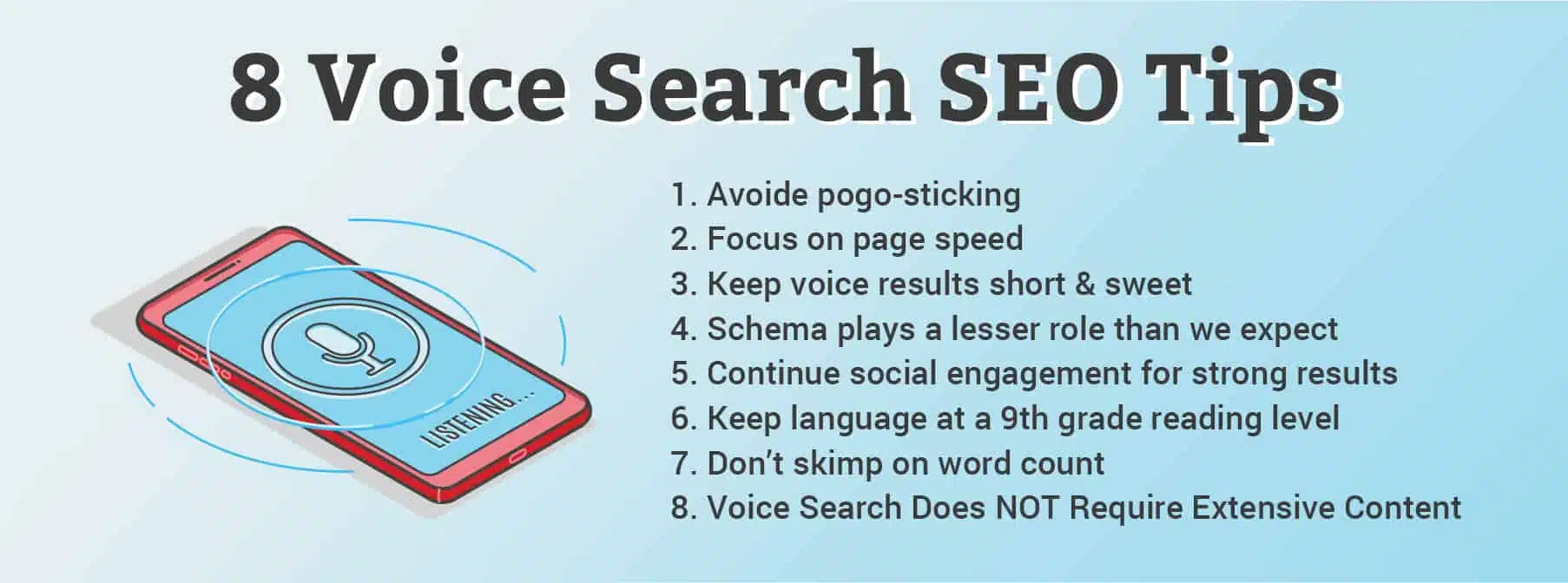
By 2020, projections suggest that more than half of all searches will be conducted by voice search. This means, your site needs to optimize for the key factors that will keep your brand in front of your customers.
Voice searching is a means for customers to incorporate search engines using their spoken voice rather than keyboard input. Over the past few years, we’ve thought of voice search on primarily mobile devices. However, more and more users are employing voice search in other wearables, laptops, and smart home devices (think Alexa, Google Home, etc.). Here, Hughes Media will focus on some insight into voice search to position you and your brand for success.
Tip #1 Avoid Pogo-Sticking
Pogo-sticking occurs when customers click to your website but don’t find enough relevant information, so they quickly leave your site in search of their solution. There can be several reasons that customers aren’t satisfied by what they find on your site. First, be sure your site is customer friendly – that is, easy to read and navigate. Nothing turns away a visitor faster than a complicated website. Also, in our efforts to capture SEO success, our keywords don’t always align with the visitor’s intent. So, be careful to think like someone who is searching for your page, not necessarily for someone seeking to buy. There is a subtle difference. Once you master that, you will be in a better strategic position to attract the right audience.
Tip #2 Focus on Page Speed
Not surprisingly, when people employ voice search, they are often on the go and eager for fast results. Accordingly, page load speed is growing more and more important in Google rankings. Results show that the average voice search result page loads in just 4.6 seconds, 52 percent faster than average load times across the world. Appropriately, to have the greatest impact in voice search, be certain your site is optimized to load quickly.
Tip #3 Keep Voice Results Short and Sweet
Just as Google acknowledges fast load speeds in voice search, it also rewards concise responses when it comes to voice search. The typical voice search result is only 29 words in length. This means we should guard against verbose and off-topic results and compose voice search responses that provide thorough but focused answers. Here’s a chance for your office wordsmith to really contribute toward your success!
Tip #4 Schema Plays a Lesser Role Than We Expect
Schema has been an effective tool in helping search engines interpret the content of your website. However, recent studies have shown that 36.4 percent of voice search results pages employed Schema markup as compared with 31.3 percent for typical pages. The difference is so nominal, that it is unlikely to see a significant impact when using Schema. In fact, 63.6 percent of voice search results do not make any use of Schema anyway.
Tip #5 Continue Social Engagement for Strong Results
Though it’s difficult to prove that the voice search algorithm uses social media exposure (in fact, Google refutes any claim in this regard), there is a definite correlation between shareable content and strong ranking. When developing your content, be sure that it provides strong value and is highly engaging for the added benefit of sharing across multiple platforms.
Tip #6 Keep Language at a 9th Grade Reading Level
As with social engagement, there is no proof that Google is using reading level as a ranking measure. However, research does show that the average Google Voice Search result reads at a 9th grade reading level. Keep in mind that results should be easy for Google to pronounce, and the user has no visual guidance, so answers must be simple to understand using voice only. To keep your results at the forefront, spend a bit of extra time to ensure readability for all audiences.
Tip #7 Don’t Skimp on Word Count
Though language should remain simple and easy to understand, there is no reason to cut your content short. Testing shows that Google voice search results generally tap into pages with higher word counts. The average word count of a voice search result page is 2,312 words. This makes some sense: the more words you use, the more chance you have of matching when it comes to voice search.
Along these lines, a FAQ section on your page may bolster your opportunity to meet voice search results. The Q & A format also lends itself to a voice search pattern, perhaps increasing your chance to connect directly with the user.
Tip #8 Voice Search Does NOT Require Extensive Content
It is very uncommon for voice search results to include the exact keyword in their title tag. Therefore, creating individual pages for each voice search query doesn’t appear to be an effective voice search SEO strategy. This may be explained, in part, because voice searches are typically 76 percent longer than desktop searches. Accordingly, it will be more difficult for results to match title tags in the voice search arena. Instead, focus on quality content that may link to multiple voice search queries.
Take Positive Steps in Voice Search Today
As voice search continues to expand as a tool for your customers, be sure you are taking action to keep your brand in front of them with a strong voice search results strategy. We at Hughes Media hope this post has given you more to think about as you start to capitalize on the opportunities ahead in this expanding technology.
As we can help, we will be eager to review your strategy with you to ensure it fits your market as well as your audience. Or, if you need help getting a blueprint in voice search started, one of our experts can guide you through the process to hit the ground running quickly. We’d even appreciate the chance to congratulate you on successes you’ve had – feel free to contribute to our knowledge base with your specific achievements.
About the Author:
Deedra Hughes
Experienced President with a demonstrated history of working in the marketing and advertising industry. Skilled in Digital Strategy, Search Engine Optimization (SEO), Integrated Marketing, Advertising, and Pay Per Click (PPC). Strong business development professional with a Bachelor’s Degree focused in Communications from Ohio University.

